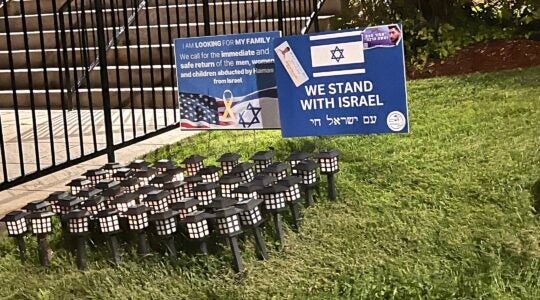NEW YORK (JTA) — The Reform movement and Jewish refugee agency HIAS called on the Israeli government to re-examine its asylum policy for African migrants.
In a news release issued Friday, North America’s Union for Reform Judaism, its Israeli counterpart and HIAS, took issue with Israel’s “anti-infiltration law,” which allows the government to detain asylum-seekers for up to 20 months in a Negev facility. They also urged Israel to offer more services for African migrants.
The Israeli High Court of Justice ruled this week that provisions of the current law are unconstitutional. The Knesset has six months to revise the law, which passed its final readings in December.
Under the measure, an amendment to an existing infiltration law, illegal migrants can be held in closed detention centers for three months and then kept at the Holot open detention center in the Negev for up to 20 months,.
Noting that the groups are “longstanding friends of Israel and committed advocates for the well-being of the Jewish state,” Union for Reform Judaism President Rabbi Rick Jacobs questioned why Israel approves a dramatically lower percentage of asylum applications from Eritreans and Sudanese than do other developed countries.
“We are deeply concerned because Israel currently accepts less than 1 percent of refugee claims. In other developed countries, 82% of Eritrean applicants and 68% of Sudanese applicants are recognized as refugees,” Mark Hetfield, president and CEO of HIAS, said in the news release, adding that the groups nonetheless “recognize that, with over 5,500 asylum seekers per 1,000,000 population, Israel has had to deal with more asylum seekers than the vast majority of other democracies.”
“We urge the government to set an example by treating African migrants with dignity and respect. It is our hope that the Israeli government will allow them to contribute to the Israeli economy and society until their status is appropriately adjudicated, rather than forcing them to be housed in the desert at significant government expense or pressuring them to relocate to an unfamiliar and unsafe third countries which offers no durable solution to their plight,” Hetfield said.
The groups also called on the Israeli government to “strengthen the infrastructure of the South Tel-Aviv neighborhoods where Asylum seekers reside and to ensure proper resources are allocated to provide services both to Israeli citizens and to asylum seekers.”
JTA has documented Jewish history in real-time for over a century. Keep our journalism strong by joining us in supporting independent, award-winning reporting.





